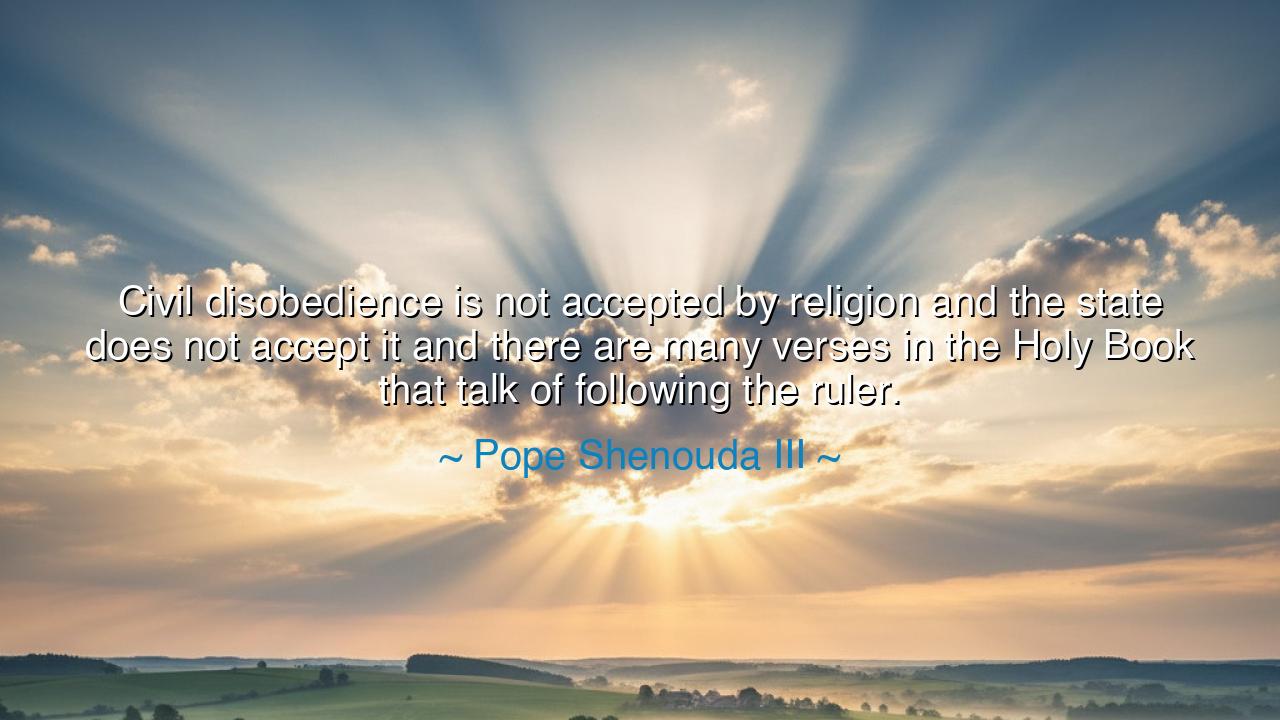
Civil disobedience is not accepted by religion and the state does
Civil disobedience is not accepted by religion and the state does not accept it and there are many verses in the Holy Book that talk of following the ruler.






"Civil disobedience is not accepted by religion and the state does not accept it and there are many verses in the Holy Book that talk of following the ruler." These words, spoken by Pope Shenouda III, resonate deeply within the framework of both religious teachings and political authority. In this statement, the Pope echoes a long-standing tradition that has existed since the time of the ancients, where the state and religion often have a mutually reinforcing relationship. The message reflects the belief that obedience to the ruler, be it a king, emperor, or leader, is paramount, and that questioning authority through acts of civil disobedience is not only seen as a breach of law but also as an act contrary to divine will.
In the ancient world, the relationship between faith and governance was seen as inseparable. Kings were often viewed as divinely ordained rulers. In Babylon, Persia, and Egypt, the pharaohs and kings were not just political figures; they were considered gods or chosen by the gods. To oppose them was not only a violation of the law but an affront to the divine order itself. Similarly, the Roman Empire also saw emperors as having divine authority, and the concept of divine right meant that to disobey the ruler was seen as not just a political rebellion but a spiritual one.
The teachings of Jesus Christ, however, offer a powerful counterpoint to this notion of unquestioning obedience. Jesus, while living under Roman occupation, spoke about giving to Caesar what is Caesar’s and giving to God what is God’s, signaling that there is a distinction between spiritual authority and earthly authority. Yet, Jesus did not call for rebellion against Rome. Instead, His teachings were centered on inner transformation and spiritual obedience to God. The idea that religious followers should obey secular authority was prominent, but not to the point of blindly following corrupt or unjust rulers. Jesus’ own death, as a result of political and religious powers, underscores the tension between religion and state.
This tension between religion and authority has continued throughout history. Martin Luther King Jr., a leader in the Civil Rights Movement, famously advocated for civil disobedience as a form of resistance against unjust laws. King’s actions were rooted in a deep faith in God, and he often quoted the scriptures, arguing that it was, in fact, the duty of a Christian to challenge unjust authority. Unlike Pope Shenouda’s statement, King viewed civil disobedience as not only acceptable but necessary when the state failed to align with the moral teachings of Christianity. King’s stance was grounded in the belief that justice, freedom, and equality were also divine commands, and thus, disobedience to an unjust state was an expression of faith.
The question then arises: how do we reconcile these differing views—obedience to the ruler as taught by Pope Shenouda III and the call to challenge authority as seen in figures like King? The ancient wisdom of Plato offers insight here. In his work The Republic, Plato speaks of the philosopher-king, a ruler whose wisdom is derived from knowledge of truth and justice. The ideal ruler is one who leads with virtue, and for such a ruler, obedience from the people is not a mere submission, but a harmonious relationship between the people and the state. In contrast, when rulers abandon justice and virtue, the people must make a moral decision about their duty to resist.
The lesson from Pope Shenouda’s words and the broader historical context is profound: the balance between obedience and resistance is not easily defined. In moments when the state or religion veers into corruption or injustice, civil disobedience can be a powerful force for restoring justice and moral integrity. At the same time, obedience to lawful authority is vital for maintaining the order and peace of society. The key is discerning the difference between a ruler who leads with wisdom and justice and one who rules with tyranny. Obedience to the right kind of authority is a virtue; defiance against the wrong kind can be a moral imperative.
Thus, we must approach authority with both wisdom and courage. In our own lives, we must ask ourselves: are we obeying leaders and systems that align with our highest moral and spiritual values? Or are we simply following because of fear, convenience, or tradition? When the state or religion asks us to act in ways that are unjust or immoral, we must find the courage to speak out and resist, even if that means going against the flow of societal norms. Like King, we must not shy away from civil disobedience when it is the path to justice and truth. But we must also understand that true obedience to God and the good of society means standing with what is right, even in the face of great personal or political cost.






AAdministratorAdministrator
Welcome, honored guests. Please leave a comment, we will respond soon